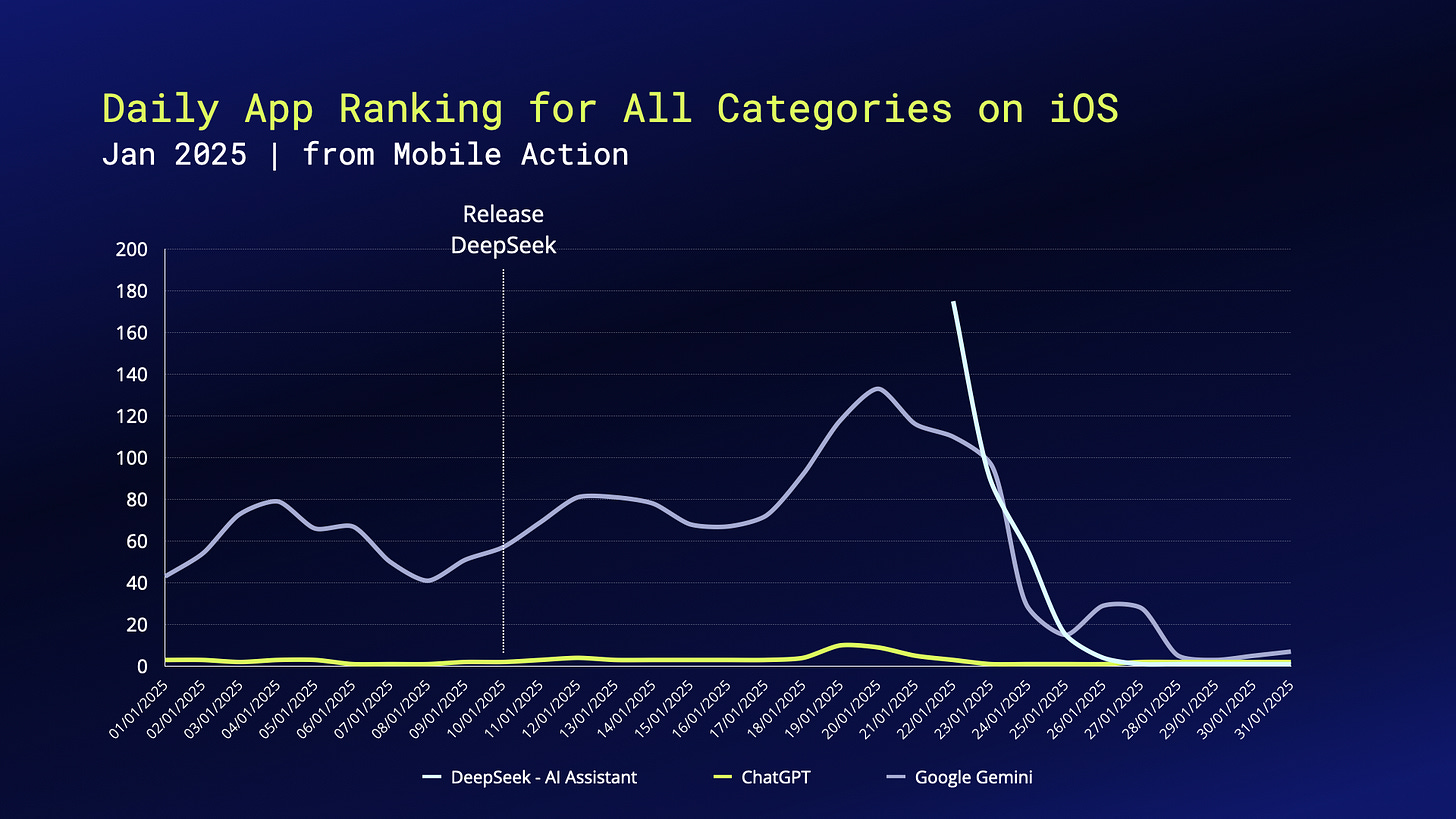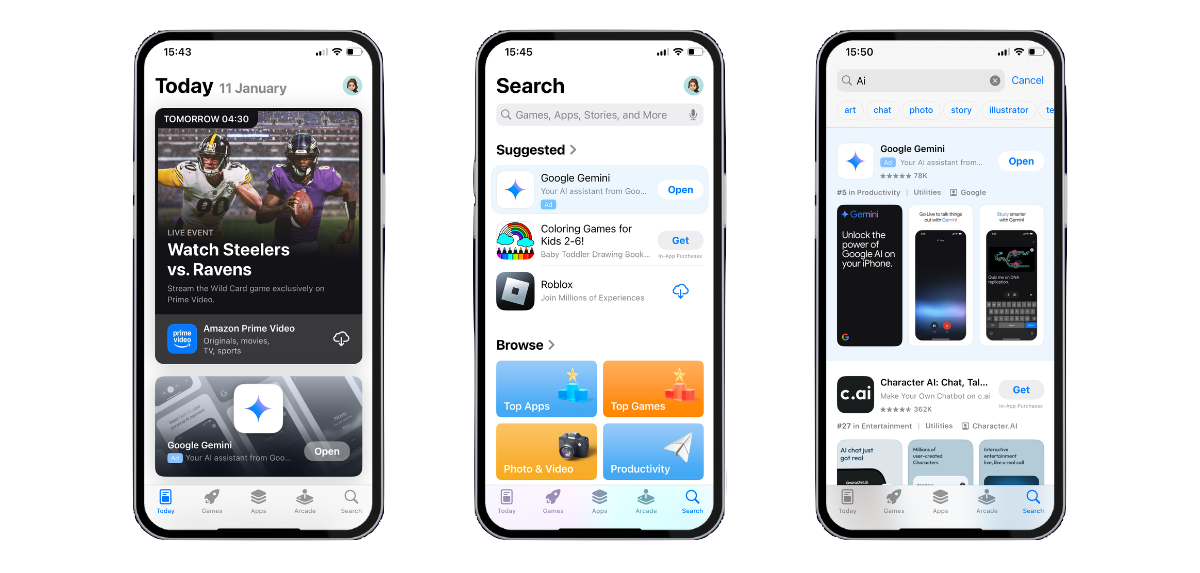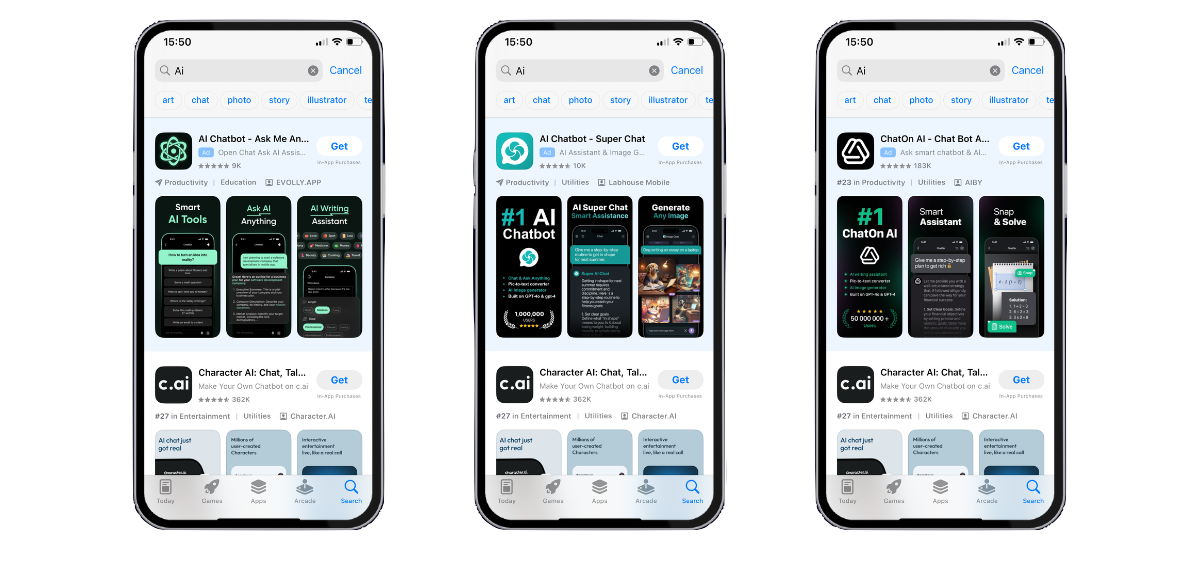AI App Wars: Deep Dive in a Heated Race
This article dives into DeepSeek disruptive launch, ChatGPT’s impressive growth, the rise of regional competitors, and their ads strategy sharing the AI app wars.
31/01/2025 Update
Only 15 days have passed since I released this article, and a lot has already changed.
That’s how fast this industry moves.
DeepSeek, a Chinese startup, recently launched its open-source AI model, R1, and it has made massive waves in the tech industry. Not only is it competing with models from OpenAI and Meta in benchmarks, but its efficiency in training, using way fewer resources than others, has even impacted NVIDIA and energy company stocks.
But beyond the tech world, DeepSeek’s app has also been crushing it on the iOS & Google Play Store rankings, reaching top positions in key markets like the US, France, UK, Canada, Germany, Japan (#2), and Mexico.
No crazy marketing budgets. No ASO magic. Just a disruptive product, launched at the perfect time.
While big tech leaders were busy at the inauguration of their new powerful business partner, DeepSeek was quietly becoming one of the most successful AI apps in the world.
After launching, DeepSeek slowly climbed the Productivity charts in the US, breaking into the top 50 within just three days. And only two weeks later? It took the #1 spot in the category.
And in All Categories? DeepSeek really conquered the world on January 26th—just 16 days after launch—by becoming the #1 app in the US.
Even more impressive?
A week later, it’s still holding that top spot, pushing ChatGPT out of its long-standing position. And despite millions spent in user acquisition, Gemini is struggling to keep up, while it still hasn’t managed to surpass OpenAI.
So, the real question is:
How long will DeepSeek stay there?
Well, competitors are already trying to get DeepSeek traffic.
When you search [DeepSeek] on the AppStore, Perplexity, Gemini & Claude appear up there.
The smaller apps went even further, already mentioning the new model in their creatives, hoping to ride on the hype and increase their CTR & Conversion Rates.
In the article below, written just days before this massive shift, I asked:
Will other players like Gemini or Perplexity gain global traction?
Will OpenAI start investing in UA to maintain its lead?
Which AI app will drive the next wave of innovation and growth?
Some of those questions have already been answered. And now, new ones are emerging:
How will competitors react?
How will strategies shift?
And will OpenAI finally start investing in UA?
I guess only time will tell.
AI is everywhere. On our laptops, on our phones. Artificial Intelligence has become a part of daily life. From removing the background of a photo to generating lyrics for a new song or making an email more friendly, there are endless use cases, and even more apps to choose from.
But the AI app space is changing, and fast. With the category growing so quickly, we’re seeing both exciting opportunities and major challenges, like rising competition in regional markets. This article looks at ChatGPT’s revenue boom, the competition bringing challenges in specific regions, and the advertising strategies these apps are using to keep up.
Insights shared in this article come from the Sensor Tower report “ChatGPT Maintains US Lead; Share Weakens in Emerging Markets”, with graphs and additional insights & analysis sourced from Mobile Action.
The Rise of ChatGPT
No need to introduce ChatGPT anymore. When OpenAI released the GPT-3 model, it disrupted everything. AI became the buzzword of the moment, and since then, AI chatbot apps have been popping up everywhere. Big players entered the space, like Google with Gemini and Microsoft with Copilot, while underdogs like Claude (Anthropic) and Perplexity found their own niches.
But ChatGPT’s growth stands out as the most impressive. Sensor Tower data shows that ChatGPT reached 160 million MAUs in Q3 2024. It was also the third-fastest app in recent years to hit 50 million MAUs globally, reaching this milestone just five months after launch.
Revenue growth has followed the same upward trajectory. The release of GPT-4 accelerated everything, with downloads and revenue peaking in May 2024. This brought ChatGPT’s US revenue market share to an incredible 60%, as shown in the graph below.
A Shifting Regional Landscape
While ChatGPT is the most popular AI chatbot globally, dominating most markets, its competitors haven’t given up—and in some regions, they’re catching up fast.
In the US and Europe, ChatGPT still leads in downloads, though Gemini is closing the gap since its launch in November 2024. But if you look at other markets, it’s a different story.
In India, Gemini has taken off, now holding around 50% market share and surpassing ChatGPT in weekly downloads. Meanwhile, in LATAM, smaller apps like Nova AI Chatbot are growing quickly, now reaching 10% of total downloads (compared to just 3% in the US).
These shifts are largely driven by cultural and economic factors. In emerging markets like India, affordable subscription pricing is a big draw for smaller apps. Google also benefits from its global brand recognition, which plays a huge role in Gemini’s rapid success. As you can see from the geo-split chart below, Gemini’s performance in India is especially strong, making up almost 8% of all downloads in the market.
iOS Organic Rankings
In terms of App Store Optimization, AI apps are getting incredibly creative in how they rank, acquire, and retain users.
Let’s start with rankings. In the US Productivity category at the end of 2024, ChatGPT holds the #1 spot, with Gemini in third. Microsoft’s Copilot is down at #19, Perplexity at #36, and Claude at #50.
When we look at the All Categories rankings, most apps disappear entirely, with only ChatGPT and Gemini staying visible. ChatGPT has been holding steady in the top 5 for several months now, showing no sign of slowing down.
ASO, User Acquisition & Advertising Strategies
Each app is trying to stand out by leaning into its strengths and crafting unique UA strategies.
ChatGPT seems to rely entirely on organic growth. There haven’t been many ads seen from them—they’re banking on great PR and a well-known name to keep the momentum going. But I’ve seen big apps and games try this strategy before, and the reality is that UA becomes inevitable once competition heats up and virality slows down.
Other apps are more aggressive. Perplexity, for example, targets urban professionals with strategic partnerships like its deal with Uber One, offering members a free year of Perplexity Pro.
Microsoft’s Copilot takes advantage of its ecosystem, cross-promoting the app through Outlook, OneDrive, and Authenticator. This strategy works well for Microsoft users who are already deeply embedded in their ecosystem. They’ve also gone big on YouTube and OTT ads, reaching users during high-attention moments.
Google has gone all-in on promoting Gemini. They’ve invested in ads on premium publications like The Washington Post and Forbes, as well as prominent placements on the App Store. This strategy is all about generating awareness at the end of the funnel, where high-value users convert.
Anthropic has taken a similar approach for Claude, heavily promoting it on the App Store with placements in the Today tab, Search tab, and Search Results.
Meanwhile, smaller apps are competing in the App Store by bidding on keywords like “chatGPT” and “AI.” Surprisingly, OpenAI hasn’t protected its brand term, giving these apps a chance to ride ChatGPT’s wave of popularity.
The AI App War Continues
While ChatGPT dominates globally, markets like India and LATAM are proving there’s room for other players to grow. New apps, like X’s Grok, are also entering the scene, keeping the category in constant motion.
The importance of regional strategies, user engagement, and tailored advertising will only grow in the months ahead. Relying solely on organic growth might work for now, but it’s not a sustainable strategy in such a competitive space.
The big questions are: will apps like Gemini or Perplexity find global traction? And will OpenAI eventually invest in UA to maintain its lead?
One thing’s for sure: the AI app wars are just getting started.

















Having played around with AI apps quite a bit (remember my experiment running an entire company with AI?), this analysis resonates deeply with me.
The most fascinating part isn't ChatGPT's dominance - it's how different markets are developing their own "AI personalities." Just like when I was building my little AI experiments, I noticed that what works in one context completely fails in another. The Indian market choosing Gemini? That's not just about pricing - it's about trust and familiarity D:
You know what's really interesting? While these big players are duking it out, I've been experimenting with AI in much simpler ways - like my recent project using Claude for dynamic content updates. And here's the thing: sometimes the most valuable AI applications aren't the flashiest ones, but the ones that solve specific problems really well.
The part about organic growth versus paid acquisition hits home too. We're at this fascinating tipping point where being first isn't enough anymore - even AI apps need solid marketing strategies. (Reminds me of my earlier marketing days when everyone thought "if you build it, they will come" - spoiler alert: they don't!)
Want to see an example of practical AI application? I recently wrote about this: https://thoughts.jock.pl/p/dynamic-claude-chat-automation-guide
What fascinates me most about this whole situation is how quickly the landscape is changing. Makes you wonder - will we even recognize this market in six months?